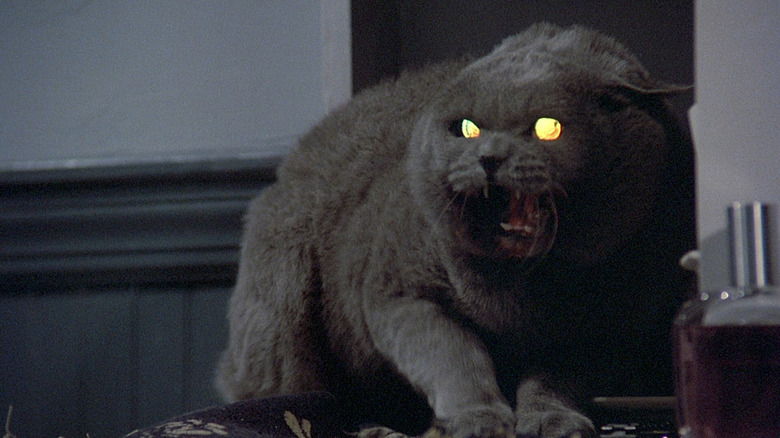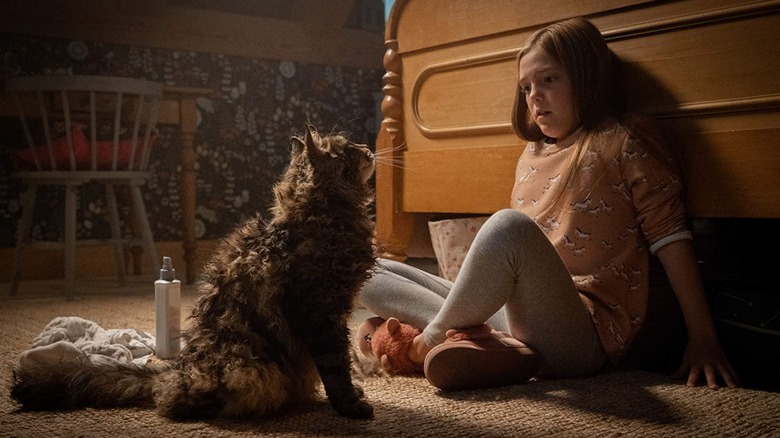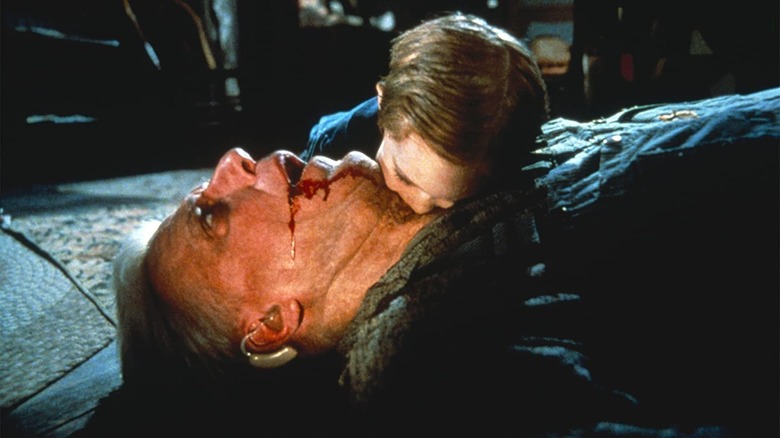Stephen King Has A Complex Relationship With Pet Sematary
Stephen King first published "Pet Sematary" in 1983, a time when he — by his own description — was battling addiction. In his 2000 book "On Writing," King speaks frankly about his drinking and substance abuse throughout the '80s, and even claimed to not remember writing his 1982 novel "Cujo." His friends eventually staged an intervention, and King eventually became sober sometime in the late 1980s and has remained so to this day. His first novel after getting clean was "Needful Things" in 1991.
"Pet Sematary" is about a Chicago family — mom, dad, older daughter, younger son, and Church the cat — who move to a remote town in Maine for the dad's job. In the mountains, not terribly far from their new home, is a pet cemetery (misspelled on the handmade sign, hence the misspelled title). The outer part of the cemetery, however, is located on sacred Mi'kmaq land, and when the family cat dies and is buried there, it comes back to life shortly thereafter. As dictated by the tenets of horror stories, the cat is now demonic. When an accident also befalls Gage, the 2-year-old son, dad unwisely uses the cursed cemetery to resurrect him as well. It goes about as well as one might expect. "Pet Sematary" was adapted to film in 1989, and then again in 2019.
Because of his drinking, King doesn't necessarily have a very warm recollection of the books he wrote at the time, and a lot of his personal demons worked their way into his words. In a 2019 interview with Entertainment Weekly, King tells of how he revisited "Sematary" for the first time in years and how weirdly unnerved he was by the experience.
This is awful
Stephen King immediately addressed unsubstantiated rumors that "Pet Sematary" was considered too scary to publish, but then went on to reveal that it was, in 2019, shocking even for him:
"No, I mean it's true. I listened to it last year when I was down here in Florida walking on the beach with the dog. Michael C. Hall did the audiobook. I was curious about it. You know, I hadn't been near it in 20, 25 years. So I listened to it, and thought, 'My God, this is just awful. It's just as dark as can be.'"
Even in the 1980s, King recalled taking a look at what he just completed and sensing grave implications. "Sematary" was, it turns out, modeled off of King's house, life, and scenario at the time.
"I just had the greatest time writing the book until I was done with it. And I read it over, and I said to myself, 'This is awful. This is really f****** terrible.' Not that it was badly written, necessarily. But all that stuff about the death of kids. It was close to me, because my kids lived on that road ... We moved to this little town called Orrington, because I got a job as writer in residence at the University of Maine. We rented this nice house on the river, and a pet cemetery was in back of it. There was a path that went up there that kids kept mowed."
Poor Smucky
And the parallels didn't stop there. In "Pet Sematary," the road outside the protagonists' home is a death trap, with cars and trucks often hauling by unexpectedly, and often hitting animals — and people — who aren't careful. Stephen King's own home was right next to a similar road, and his son nearly wandered out once, and his daughter lost a cat. In real life, his daughter buried their cat in the nearby pet cemetery. He continued to EW:
"That night, after we buried [the cat, Smucky], we heard [King's daughter] out in the garage. She was jumping up and down on those popper things that they wrap fragile stuff in. She was shouting, "God can't have my cat. That cat is my cat! ... Let him have his own cat.' And I put all that in the book. And yeah, we were in the field, and there really was a busy road there. Everything in the book up to the point of the supernatural stuff is true."
So King took his real-life scenario and added in elements of W.W. Jacob's famed 1910 short story "The Monkey's Paw" to create a dark domestic scenario where characters make bad decisions and toy with death. The introduction of the Mi'kmaq land also gives "Pet Sematary" an anti-colonialist bent. Both the 1989 film and the 2019 film have been praised for how unnerving they are, and how badly things end for everyone (the final shot of the 2019 film is especially bleak). If King managed to scare himself with his novel, then it certainly will work well on the rest of us.


